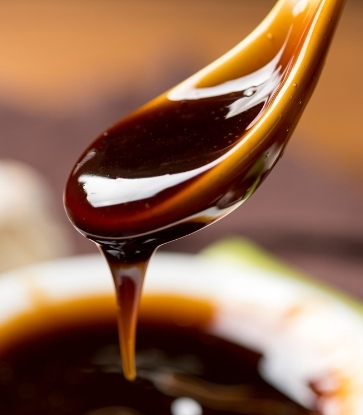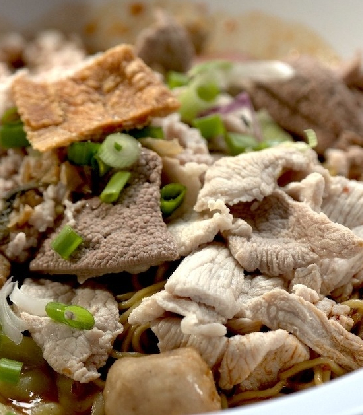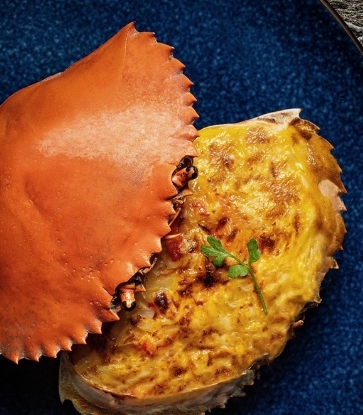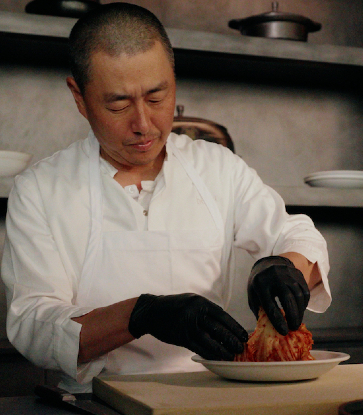Ee-fu Noodles (or yi mein) is a much-loved Chinese classic dish that is often served during festive or celebratory occasions. There are many versions regarding its origin, but the oft-mentioned one dates back to the late-18th century, during the reign of the Qianlong Emperor of the Qing Dynasty. At the time, there was a magistrate in Yangzhou, Yi Bingshou (1754-1815 CE), who was also a well-regarded gourmand.

The Origin of Ee-fu Noodles: A Delicious and Happy Accident
During one of the magistrate’s frequent banquets, his much-harried head chef accidentally dropped a batch of noodles into a large vat of bubbling-hot oil instead of soup broth. The quick-thinking chef, not wishing to delay the progress of the dinner, decided to simply drain the noodles and cover them with a flavoursome sauce. The result was an instant success amongst the diners, as the aromatic noodles were delightfully spongy and were also able to soak up the flavours of the gravy.
Thus was born the popular Ee-fu Noodle dish. "Ee" is a variant on spelling "Yi” (Yi Bingshou’s family name), whilst “fu" meant household. Hence, "Ee-fu Noodles" (Chinese: 伊府面) basically translates as "noodles from the House of Yi".
Fun fact: Yi Bingshou’s head chef was also credited for creating Yangzhou fried rice. The Qian Long Emperor had tasted this dish during a visit to Yangzhou, and liked it so much, he commanded the Forbidden City chefs in Beijing to include it in their list of imperial dishes.

Elegant Inn Kuala Lumpur
Over here at MICHELIN Selected Elegant Inn in Kuala Lumpur, Kelantan-born executive chef Wesley Ng does a mean rendition of the Ee-fu Noodles.
Ng started off working at Elegant Inn 22 years ago, the traditional way — as a young apprentice under a Hong Kong-born master head chef (“sifu”). From the experienced “sifu”, he learnt various kitchen secrets, especially how to obtain wok hei (breath of the wok) through proper cooking techniques.
When the Hong Kong “sifu” left just two years later, Ng was asked by Elegant Inn's manager and proprietress, Jeannette Han, to become her business partner, and also to take over the mantle of head chef. That partnership had endured ever since.
RELATED: The Best Places for Chinese Food in Kuala Lumpur & Penang
Han is a Singapore-born, long-time Kuala Lumpur expatriate who basically made Elegant Inn what it is today. She’s a passionate gourmand, as well as a consummate perfectionist, who leaves no stone unturned in ensuring each dish achieves its potential through the use of the best ingredients, as well as meticulous application of proper cooking techniques.
She had first acquired the old Elegant Inn in 1991, then owned by a Hong Kong couple and located in the working-class suburb of Cheras on the outer fringes of the city. She relocated the restaurant to Kuala Lumpur’s central business district, and singlehandedly transformed it from a simple, neighbourhood eatery into the sleek, sophisticated restaurant that Kuala Lumpur’s finicky Cantonese gastronomes know and trust today.
Elegant Inn's Crabmeat Ee-fu Noodles
Amongst Ng's many specialities is the all-time favourite: Crabmeat Ee-fu Noodles, with its inimitable, spongy texture. As the chef says, “As long as one gets the basics right — fresh, good produce, as well as proper timing during the cooking process — it really doesn’t matter if it’s the deluxe lobster version, which I often do here, served with French goose-liver foie gras, or just a standard basic noodle-and-mushroom one. The end result should always be pleasing to the diner’s palate.”

Ng is happy to share the secrets of his tasty Ee-fu Noodle recipe with the MICHELIN Guide. “This was one of the first noodle dishes taught to me by my sifu,” Ng reminisces.
Any secret ingredient or technique on what makes his noodles so special? “Passion”, quips the chef without hesitation. “For any dish to be done well, it’s important that the chef’s heart is in it.”
Besides the popular Ee-fu Noodles, Elegant Inn is also famous for its Lap Mei Fun (steamed rice topped with Chinese sausages and waxed meats), using their own house-cured meats instead of imported ones from Hong Kong or Guangdong, China. For the upcoming Lunar New Year, the all-time popular yu sheng and poon choi will also be available.
Elegant Inn's Crabmeat Ee-fu Noodles by Chef Wesley Ng
For the Crab Meat
● One 250g live mud crab
1. Steam the crustacean for 10 minutes and allow it to cool down
2. Remove the crab meat from its shell
3. It should yield around 50g of meat. Set this aside.
For the Ee-fu Noodles
● 1.5 pieces of ee-fu noodles (150g in dried form)
1. Bring just enough water to boil over the stove on high heat. Use just enough water to cover the noodles.
2. Add the noodles to the boiling water — it’ll take about 2 minutes for the noodles to soften.
3. Turn off the heat and leave the noodles to soak in there.
Other Ingredients to Prepare
● 50g oyster mushrooms
● 15g carrot
● 60g Hong Kong nai pak choy (milk cabbage), cooked
For the Superior Soup Broth
● Half a chicken
● 300g chicken feet
● 300g pork ribs
● 100g Chinese ham
● 100g eel
● 4 pieces Japanese dried scallops
● 6 litres water
1. Bring all of the above ingredients to boil in water for 5 minutes.
2. Drain and wash all the ingredients with cold water.
3. Bring 6 litres of water to boil, and then put all the ingredients in it to slow-cook for at least 3 hours.
4. After the 3-hour cooking period, extract just the soup, and then set aside.
For the Seasoning
● 200ml of the Superior Soup Broth
● 2 teaspoons soy sauce
● Half a teaspoon mushroom soy sauce
● ½ teaspoon sugar
● 1 teaspoon sesame oil
● 3 Tablespoons pork lard
● White pepper to taste
Cooking Method:
1. Heat 3 Tablespoons of pork lard in a wok.
2. Add the oyster mushrooms and crab meat into the wok and stir-fry for 5 seconds.
3. Pour in 200ml of the Superior Soup Broth
4. Slow cook for 10 seconds.
5. Add the soy sauce, mushroom soy sauce, sugar, and sesame oil to the wok and allow the mixture to braise.
6. Taste and make any adjustments to the gravy now, while it’s still thick. Once the noodles are added at the next step, all the gravy will be soaked up.
7. Drain the noodles and add them into the wok after the sauce has been adjusted to your liking.
8. Toss over high heat until the noodles have completely absorbed all of the sauce.
9. Add the nai pak choy (milk cabbage) and carrot. Continue to stir-fry together.
10. Continue cooking on high heat until all the liquid has cooked out, about 2-3 minutes.
11. The dish is ready once the noodles looked moist, and without any excess liquid sauce visible at the bottom of the wok.
12. Serve warm.
All images are by Peter Yeoh. Ee-fu Noodle illustration is from Shutterstock.
Elegant Inn is at 02-01, 2F, Podium Block, Menara Hap Seng, Jalan P. Ramlee, Kuala Lumpur, Kuala Lumpur, 50250, Malaysia. Make a booking by calling +60 3-2070 9399.



















